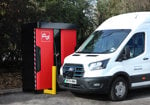This slice of good old British humour was funny at first, but after your 500th sighting of a Mini Metro sporting the same slogan, the joke was starting to wear a bit thin.
Unfortunately for many fleet managers, some of their company car drivers still share a similar sense of humour when it comes to daily rental. There is a familiar rental scenario – a driver’s car is off the road so they look for a daily rental vehicle and duly call their company’s daily rental provider to order a car for a few days.
For a minority of drivers, this is an opportunity to drive something a ‘bit flash’ for a few days and claim they are the proud owner of a BMW 7-series instead of opting for a replacement Vauxhall Vectra.
The implications of this practice can be severe and significantly undermine a company’s duty of care responsibilities. An integral part of duty of care compliance is for a company to be able to demonstrate that they have processes in place to measure and manage risk.
Effective risk management should look at the type of vehicle an individual is driving and make an assessment whether they are able to handle that vehicle.
These steps cannot be taken if you don’t know what rental vehicle your driver has ordered. A fleet manager who does not know what rental vehicle one of his drivers is driving for a few days is not in a position to demonstrate that he has managed risk effectively. Without robust systems in place governing driver daily rental bookings, fleet managers can easily fall victim to other costly problems.
All too often, it is easy for drivers to stipulate how long they want the rental vehicle for without the need to obtain any central approval. Drivers are often also free to extend their rental period without needing prior approval from a fleet manager.
It is critical that fleet managers have in place a robust rental policy with their daily rental provider which stipulates a number of guidelines for each daily rental transaction.
Rental policy should include a number of key elements. Firstly, policy should include a control on vehicle group usage. This should stipulate a vehicle group, engine size and transmission type. The agreement should also clarify the duration of rental period which can be booked without fleet manager sign-off and control any additional rental extensions. In addition, type of insurance should also be detailed and agreed whether this is part of a company’s insurance cover or a supplier insurance policy.
Rental bookings can carry a number of costly supplementary charges which cannot always be controlled by policy and will always rest with the driver’s common sense.
It is therefore necessary that drivers are educated about the additional costs they can incur.
Ordering a rental car to be delivered to a home address can potentially cost twice as much as the same vehicle being delivered to a company address. Therefore, fleet managers should outlaw this practice among their drivers. Fleets should also avoid out-of-hours orders, as a car required before 8am or after 6pm will carry a substantial charge for this service.
Drivers who do not refuel their rental vehicles before it is due to be returned can also rack up additional high costs. Drivers should always be advised of the requirement to refill the vehicle before giving it back, as some rental companies will charge back fuel to the customer at crippling rate of £1.50 per litre. In large fleets, fleet managers cannot possibly administer every rental request and there has to be an emphasis placed on drivers to order rental vehicles responsibly.
Giving drivers a free reign to choose the type of rental vehicle is not the answer and can have duty of care and financial repercussions. The development of a robust rental policy can effectively police this process and set out clearly-defined guidelines which cannot be breached, even by an unruly driver intent on taking his dream car out for a spin. Stuart Russell, head of daily rental, Arval















Login to comment
Comments
No comments have been made yet.